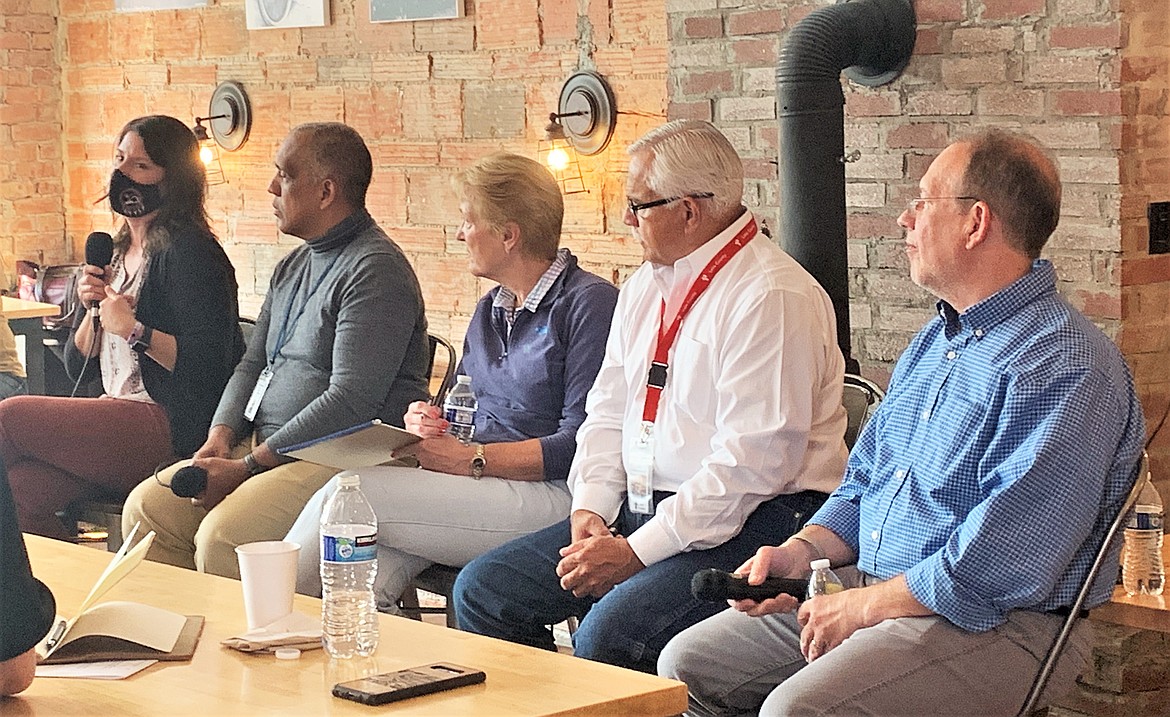Polson holds conversation on housing crisis
The city of Polson estimates nearly 1,000 additional housing units are needed in the next four years to keep up with the demands of a surging population, and the city’s process for reaching that goal took another step forward Friday with a gathering at Blodgett Creamery on Main Street.
“The need is so evident, and it’s glaring in our face,” said Jody Perez, executive director of Salish and Kootenai Housing Authority. “Even when we do secure funding (for new housing), we can’t find contractors.”
Perez was one of five panelists who spoke and answered questions at the event hosted by the city, which billed it as an “honest conversation about housing.” Joining Perez were: Juan Escano, Community Development director for Polson; state Rep. Linda Reksten of House District 12; Lake County Commissioner Bill Barron; and Polson City Manager Ed Meece.
The event drew around 50 people, including several developers, business owners and local leaders. The two-hour conversation sometimes strayed from the topic of housing, but that merely illustrated how deep the problem goes. Many local employers are struggling to build a staff, as the pool of eligible employees who are able to live locally — or even within commuting distance — appears to have dried up.
Questions also arose about infrastructure, mainly how the city will be able to maintain and expand its roads and water and sewer systems under the crush of the population influx. Some noted that local law enforcement and emergency services are beyond stressed as well.
Reksten said she’s doing her best to steer state money to help Lake County, and she hopes the Gianforte administration can find a way to use funding from American Rescue Plan Act to assist with the local housing crisis.
Escano pointed out that the problems go beyond funding, however.
“We can’t build enough because we don’t have the workforce to build. We can’t build our way out of this. It needs to be accompanied with policy.”
Commissioner Barron said the county has added approximately 3,100 residents since April alone.
“The big shot has been since COVID hit,” he said. “Now they can work from home — our internet is getting better.”
The topic of short-term rentals, like those listed on Airbnb, and how they may be making the housing problem worse also was raised. Barron said there are at least 470 such units in the county, and even when they exist within zones that prohibit such use, the county doesn’t have the resources to police it.
“People are doing it whether it’s zoned or not,” Barron said, adding that regulating short-term rentals can be a perilous legal endeavor.
Escano said the city is looking at financial incentives to promote more high-quality prefab building as a short-term solution.
“You can stick build as is traditionally done, or do prefab to get more investment on the ground faster,” he said. “We’re not going to force anyone, but rather incentivize it.”
The same goes for a lot of second-story units in the downtown area that traditionally served as housing but have been converted to storage. Escano has said he thinks financial incentives may turn that trend around as well.
Developer Mike Maddy suggested the city consider reviewing its impact fees as a way to promote more building. Impact fees are collected by the city on new projects to cover the cost of any new infrastructure that is required.
City Manager Meece said reducing or eliminating impact fees is not the way to go.
“In the end, someone has to pay (for infrastructure),” Meece said. He said the problem with reducing such fees is that it puts the burden on existing residents for the benefit of new ones.
Meece did say there may be room for temporary impact fee adjustments on certain types of developments such as tiny home clusters.
Along those same lines, Escano said he and city staff have been reviewing Polson’s permit process in search of ways to speed it up.
“Building and development codes are being streamlined.”
A woman in attendance said she recently overheard a man bragging about having purchased 18 properties in a single day and asked what can be done about outsiders buying everything up.
After a long moment of silence, Perez blurted, “Build a wall,” prompting a round of laughter.
Escano and Perez also discussed a countywide housing assessment that’s currently in the works. They hope to have the assessment completed by the end of the year. Escano said once it’s done, a comprehensive action plan can be developed and implemented.
“We need a better definition of what’s going on,” Escano said.
Friday’s discussion was moderated by Polson Chamber of Commerce President Brian Miskimins. David King of David W. King Pictures filmed the event. It can be viewed on Vimeo at https://vimeo.com/589890089.

